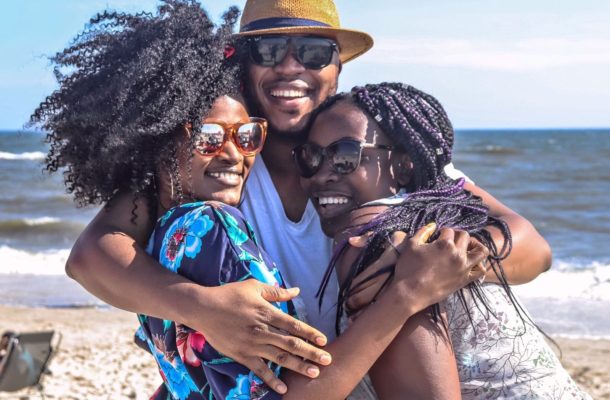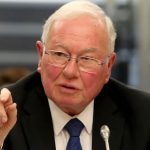I’m 35 years old, which is the kind of age when your parents, or even random people at dinner parties, start asking when you’re going to ‘start a family’ too. Thankfully I rarely get asked that question because I don’t really speak to my parents, never go to dinner parties, and most people don’t realise I’m 35 because—as a visibly genderqueer person who likes colourful clothing—they always seem to assume that I’m a child.
But actually I’ve already started a family myself, just a different kind of family to the ones we’re normally used to. While ‘proper’ families spend their weekends at IKEA or hiking in national parks, I’m in the club dancing to Whitney Houston with mine, or in an anarchist meeting or a collective cleaning day for the local social centre.
When you don’t have a nuclear family and you live outside of that tradition, knowing the purpose of the family and who gets to be a member is a little complicated. On an abstract level, family could be seen as the relationships that reproduce us i.e. that provide us with those things our jobs deplete but that we don’t or can’t buy—like care, cleaning, cooking, love, safety, and other domestic, personal and emotional things.
Family isn’t always easy to separate from friendship or from work since they all resemble each other in different ways and are interdependent. In particular, and as marxist feminists have argued, capitalism is dependent on the unpaid domestic and emotional work that women are expected to do for men.
In Northern Europe where I live, family is usually understood as marriage, kids and a mortgage. But as I was growing up, I decided this setup wasn’t for me. I decided to bail on ‘womanhood’ and fight my way out of the patriarchal system of two genders, which in my case also meant opting out of the traditional notion of the family.
So at the moment, my family consists of my sister who lives up the road from me, a group of about five very close friends whom I consider my queer siblings, plus the three housemates I share a home with. My siblings, biological and figurative, are the people with whom I talk every day, tell everything, ask for advice, and go on holidays; people who I understand, feel understood by, and love.
My housemates are less close, but they’re the people I live with so we share domestic labour and support each other when we’re sick or injured. They held me when I came home the evening that my girlfriend of two years dumped me via text, and they’ve always brought me soup whenever I’ve been ill. I remember this with fondness when it’s my turn on the rota to clean the shower or scrub the floor.
Most people don’t grow up dreaming about a family like mine. Many would probably assume that I lack the closeness or commitment that comes with traditional family ties, or that I’m immature or somehow incapable of having a ‘proper’ family. As I’ve experienced when fishing in my pockets for my ID at tills and bars, gender—which is intricately linked to family roles—is closely connected to the idea of a person’s maturity.
As it happens, I and my queer siblings didn’t grow up dreaming of our current family setup either: so many queers are disowned by their families, or have their relationships with their parents turn weird when they come out. Today 40 per cent of homeless people under 25 are LGBT+, many because they are kicked out of home.
For me though, a different definition of family works both personally and politically: it helps to make my own world better, and it enables me and my family members to share emotional and domestic labour more equally, live up to our values more easily, and spend more time organising and campaigning for social change.
There are good reasons why I’ve rejected the roles of woman and wife. It wasn’t because I was ‘born queer;’ it was because I wasn’t willing to play the well-rehearsed roles that women have played in nuclear families since the beginning of capitalism—to do the cleaning, cooking and other domestic work for another person, usually a man, who is fully capable of doing it himself; or to jump in and take care of his emotional stress when it doesn’t occur to him how to sort it out on his own.
Based on current UK figures, wives do ten more hours of housework per week on average than their husbands. Not to mention childcare, and being the person who sacrifices herself to keep other people’s lives together.
It’s not that I’m selfish; in my family we’re very mindful of how much emotional and domestic labour we put on each other. We’re not ungenerous with our love, and we probably do way more counselling and crying and cleaning the bathroom for each other than most nuclear families.
But we’re careful not to free-ride on each other or dump problems at each others’ doorsteps. Of course we all have times when we’re needier or when we’re going through difficult patches, but nobody keeps a tally of who’s asked for what.
Unlike many wives in traditional relationships, me and my siblings can opt out if we’re having a bad day and come back the day after. Instead of calling each other up and immediately pouring it all out, we check first: ‘is this a good time to talk? I could call Suzy instead. I just need to talk about something horrible that happened’.
And saying ‘no’ every now and then is completely legit. How helpful is it to be supported by someone who’s barely holding it together anyway? And how does it feel to ask for help from a loved one you can see is already depleted themselves?
By extending my family to a larger number of people I have both security—since there will always be someone there when I need them—and the freedom to say no.
The only life-long member of my family is my biological sister, and the fact that I’m not sure if my current family constellation will be exactly the same for the rest of my life is both a good and a bad thing. I’m probably missing out on some of the security that traditional family structures offer. Since there aren’t any clear social norms that govern how nebulous queer sibling-families work, we’re slowly working it out on our own.
In this neoliberal era of privatisation and austerity, who is it that would look after me if I got seriously ill? For whom would I take time off work to do the same? The answers are unclear, but we’re talking about it. And while we’re doing that, we’re also campaigning against welfare cuts and organising for a collectively owned economy.
The point is to contribute to social support structures that can help everyone when they need it—whether it’s state welfare, or even better, welfare that’s not organised through a violent, domineering and exclusionary institution such as the nation-state. And to work against our society’s expectation that women, femmes and nonbinary people will be at hand to do the unpaid care work.
As well as putting question marks around security, though, not having a solid constellation of family members has also been liberating. I’ve had friends and partners in the past who are very close with the nuclear families in which they grew up, and I’ve seen how their families can act as a brake on their exploration of the values and politics they want to live by.
They have a load of duties and expectations that I don’t have: to get married, produce grand-children or be a ‘good girl.’ Not having a nuclear family has allowed me to rethink my life choices radically; I’ve been able to try different things, move to new cities, and be inconsistent in my identity.
Though I’m talking about ‘freedom’ I want to clarify that my family structure isn’t about becoming more individualistic or unattached. I haven’t chosen this family setup so that I can be an autonomous individual who commits to nothing and needs nobody but themselves.
On the contrary, I need my family. In fact, I need everyone in the broader society that I’m a part of, whether it’s the anarchist political scene or the queer community; everyone I pass on the street; or the migrant workers in Portugal who grow my food.
The liberal idea of the self-sufficient individual is a myth spread by capitalists to justify the notion that competition and inequality are somehow natural. In reality we all depend on everyone else for our survival: how could we get good quality health care, education, food, transport, communications, or anything else worth living for if we didn’t club together with others?
People often say that a society based on sharing and mutual gain is utopian; it can’t exist in real life. But that isn’t true. We already practice socialism within our families and between our friends. What we need to do is to extend more of it to others all around us, and that’s what my family is trying to do.
This article was posted by Transformation.















